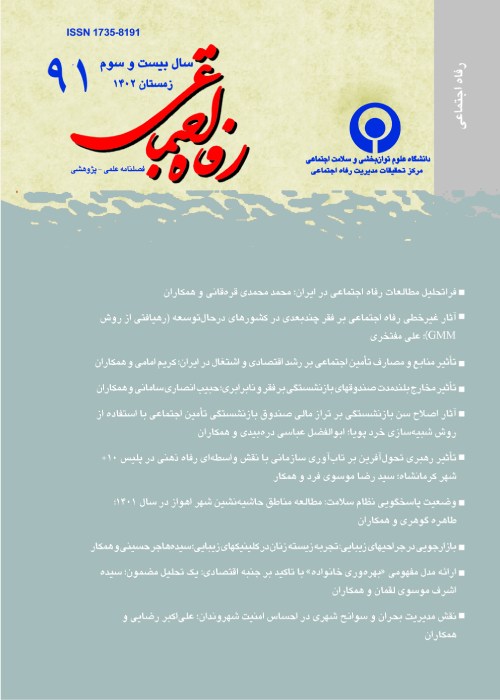The Effectiveness of School-based Social Responsibility Training on Attitude toward Juvenile Delinquency among Adolescent Girls
Adolescence is a time in which the values having been formed in childhood will have the opportunity to grow and mature. Besides, it is a period when an adolescent who is more susceptible to danger, may make hasty decisions that would probably lead to unfavorable behaviors including delinquency. Thus, the adolescents need to learn and master certain social skills. Social responsibility is a skill that makes the individual obliged and committed regarding the consequences of his/her decision on himself/herself and others. The present study was designed to investigate the effectiveness of social responsibility training on attitude towards juvenile delinquency in adolescents
This is a semi-experimental study with pretest-posttest design with control group. The statistical population of the study included all the female secondary high school students within the age range of 15 to 18 years old in Tehran. A sample of 92 students (45 intervention group and 47 control students) was selected from two districts of Tehran. In order to educate social responsibility, a learning protocol was designed which was different but interconnected, and included the followings: social consciousness, responsibility and its types, choices and consequences, respecting the feelings of others- respect for social diversity, rights and responsibilities, solving the problem peacefully and designing models for social responsibility (Table 1). To assess the subjects’ attitude towards the delinquency, Delinquent Behaviors Questionnaire was used. The subjects received social responsibility training for seven sessions of 90 minutes lasting for two months. Then, the post-test was given. To analyze the data, SPSS24 Software and Paired and Independent T-Test, One Way ANOVA and Multivariate Analysis of Variance were used.
The mean age of participants in the study was 16.39 (S.D=0/67) years old. Based on Fisher’s exact tests and Chi-square tests, participants in the intervention and control group did not differ significantly in terms of demographic characteristics such as age, the parents ‘education, the prisoner in the family and the parents’ smoking. Result of Paired and Independent T-Test suggested that in the intervention group, the positive attitude towards delinquency significantly decreased and negative attitudes toward delinquency increased significantly; however, in the control group, significant difference was not observed for any of the dimensions of attitude towards delinquency (Table 2). The findings of Multivariate Analysis Of Variance showed that the pre-test score of positive attitude towards delinquency explains 6% and 22% of the variations of post-test scores of negative and positive attitudes, respectively. In addition, the pre-test score of negative attitude towards delinquency explains about 32% of the post-test variations of negative attitudes (Table 3).
Responsibility and its types What does personal and social responsibility mean? A Review of the previous session A review of students’ perception of responsibility Understanding various individual and social responsibilities Familiarization with the responsibility training program Understanding the importance of learning responsibility in adolescents Brainstorming- group discussion- Watching a short movie about social responsibility Choices and consequences Making a choice means accepting its consequences. Understanding the importance of predicting the consequences of a choice Understanding the short-term and long-term consequences Understanding the impact of our choices on our lives and the lives of others Group discussion - Watching a short video clip Respect for social variations - Respect for the feelings of others Understanding differences of individuals helps making better choices and respecting the feelings of others Understanding a variety of social differences The importance of respecting differences and diversity in society The importance of considering the differences and social diversity in our judgments. Brainstorming- group discussion- Understanding rights and responsibilities For every right, there is a responsibility. Understanding the concept of rights Understanding your rights and the rights of others in society Understanding various social responsibilities (religious, political, environmental, social, economic, cultural) Understanding the relationship between rights and responsibilities Brainstorming- group discussion-Role play- In-class activities Solving problems peacefully Solving a problem peacefully benefits individuals as well as society. A review of the third session: choices and consequences Students’ understanding of multiple ways to solve a problem Students’ understanding of peaceful solutions Understanding the need to choose a peaceful solution Brainstorming- group discussion-Role play - In-class activities Designing role models for social responsibility (as a parent, a school principal, policeman or a mayor) Every society (small or large) has its own rules and values that affect the choices and decisions made by its members. Students’ understanding of the role of leadership and management Students’ understanding of the necessity of laws and norms and respecting them Students’ understanding of adults’ roles Competition in the form of class work - Student group activities - Brainstorming
The findings of the study showed that social responsibility training could be effective in promoting attitude and social competencies and decreasing adolescents’ tendency to resort to deviant patterns, such as delinquency. In addition, the results of Multivariate Analysis of Variance showed that this training is more effective in younger adolescents.
- حق عضویت دریافتی صرف حمایت از نشریات عضو و نگهداری، تکمیل و توسعه مگیران میشود.
- پرداخت حق اشتراک و دانلود مقالات اجازه بازنشر آن در سایر رسانههای چاپی و دیجیتال را به کاربر نمیدهد.


